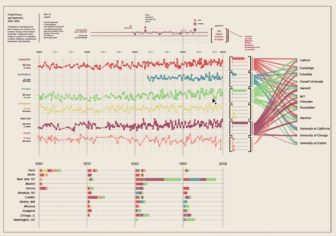 What’s the global data journalism community tweeting about this week? Our NodeXL #ddj mapping from April 9 to 15 finds an ultra useful data visualization tool that is perfect for non-programmers by @Adobe and @GeorgiaTech, a list of 99 amazing data journalism works by @GENinnovate‘s Data Journalism Awards nominees and @CARTO shares 50 experts on location intelligence to follow.
What’s the global data journalism community tweeting about this week? Our NodeXL #ddj mapping from April 9 to 15 finds an ultra useful data visualization tool that is perfect for non-programmers by @Adobe and @GeorgiaTech, a list of 99 amazing data journalism works by @GENinnovate‘s Data Journalism Awards nominees and @CARTO shares 50 experts on location intelligence to follow.
Dataviz Without Programming
This could save non-programers a lot of time and headaches. Data Illustrator is a program that allows you to create infographics and data visualizations without having to know programming. It was created as part of a research collaboration between Adobe Systems Inc and Georgia Institute of Technology.
Awesome!! Life expectancy data (♀♂) from all 🇳🇱 municipalities used to take hour to visualize in @Illustrator, now done in minute thanks to @illustrate_data 😃Download data https://t.co/8eGnY0agtd and try it! #dataviz pic.twitter.com/8AUxZXxFeq
— frédérik ruys (@fruys) April 15, 2018
Data Journalism Awards Shortlist
In 2018, the Data Journalism Awards received 630 entries from 58 countries. The amazing body of data work from these 99 nominations made this year’s shortlist — including a few GIJN members!
The #DataJournalismAwards 2018 Shortlist is here: 99 nominations across 12 categories
➡ https://t.co/FfafXnwoMX
The competition, organised by GEN, with support from @GoogleNewsInit @knightfdn @Microsoft, in partnership w/ @Chartbeat, received 630 submissions from 58 countries pic.twitter.com/JKYzthjleX— Global Editors Network (@GENinnovate) April 13, 2018
Get to Know the Experts on Location Intelligence
Location intelligence is a young field, forming at the intersection of new technologies and existing branches of knowledge. Carto lists their 50 must-follow experts on Twitter for geospatial, data science and visualization.
In case you want to follow more #dataviz #infographics #ddj people on Twitter: https://t.co/DabIGOXUxF @CARTO pic.twitter.com/keypBdLh1P
— Alberto Cairo (@albertocairo) April 11, 2018
Curated Datasets for Teaching Data Science
Rafael Irizarry, a professor of Applied Statistics at Harvard and the Dana-Farber Cancer Institute, introduces the dslabs package which contains some datasets that he uses in his data science courses.
dslabs looks like a good collection of curated datasets for teaching #DataScience: https://t.co/3uprMyR0rS pic.twitter.com/cX8O2uFgdv
— Randy Olson (@randal_olson) April 9, 2018
Deliberating Data Ethics
Ensuring the responsible, fair and ethical use of data is one of the most important challenges our society faces today. Enigma Engineering lists some pieces that have been touchstones in their deliberation of data ethics.
“A Primer on Data Ethics” @enigma_data #ddj #vg #dataviz #opendata https://t.co/AlPX9zqhDF
— Pınar DağⓋ (@pinardag) April 9, 2018
Stanford’s Open Policing Project
The Open Policing Project by Stanford University has been shortlisted as a 2018 Data Journalism Awards nominee for the Open Data category. The project collects and standardizes data on vehicle and pedestrian stops from law enforcement departments across the United States.
Yes!! Important accountabilty work & great resource for journalists & more. Check it out: https://t.co/lvkvZeMpQz https://t.co/00rNZW19uo
— Pam Maples (@pamaples) April 13, 2018
Data Journalism Challenges and Solutions
What are the challenges in the world of data journalism today? What’s already in place to try and overcome them? What solutions and collaborations could we come up with to further solve problems faced by many data journalists, news developers and editors in 2018? Four experts discuss.
Watch the International Data Journalism Unconference at #ijf18 – featuring @NewsEdJane – live here: https://t.co/3QDzEinMBV
— PR Team at Reuters (@ReutersPR) April 13, 2018
Visualization of Linguistic Data (German)
This book, written in German by Noah Bubenhofer and Marc Kupietz, reflects on the theoretical foundations of scientific visualizations in linguistics, shows practical examples and also introduces visualization tools.
Jetzt online: “Visualisierung sprachlicher Daten”, hrsg. von Noah Bubenhofer und Marc Kupietz https://t.co/zJpysQjCFC, Die Forschungsdaten dazu ebenfalls OA im Forschungsdatenrepository der Uni Heidelberg https://t.co/YoZtiCybF2, #openaccess, #digitalhumanities, @arche3000 pic.twitter.com/HXh22tV25I
— heiUP (@heiUP_HD) April 13, 2018
Get Your OCCRP Data On
If you haven’t used OCCRP Data for your investigation, try it now. After a recent update, its search functions to cross-reference and find connections in 104 million public records is more powerful than ever. The interface currently supports English, Russian and Bosnian-Serbo-Croatian and OCCRP is looking to translate it into several more languages.
Hey global people! Who wants to help us translate https://t.co/9QVPsIbQ1x / Aleph to new languages?https://t.co/D8YTTpUG1a pic.twitter.com/OAhbYRgTum
— Friedrich Lindenberg (@pudo) April 9, 2018
Free Software and Open Source Tools for IJ
Time after time, we find Markus Mandalka’s list of free software and open source tools for investigative journalism and journalistic research popping up in our mapping of the data journalism community’s most popular tweets. Check it out.
[#INVESTIGATION] Free software and open source tools for investigative journalism and research: https://t.co/Tfb7boXujA#OSINT #journalism #tools pic.twitter.com/kljp5ZGwCr
— Serge Courrier (@secou) April 12, 2018
Thanks, once again, to Marc Smith of Connected Action for gathering the links and graphing them.

